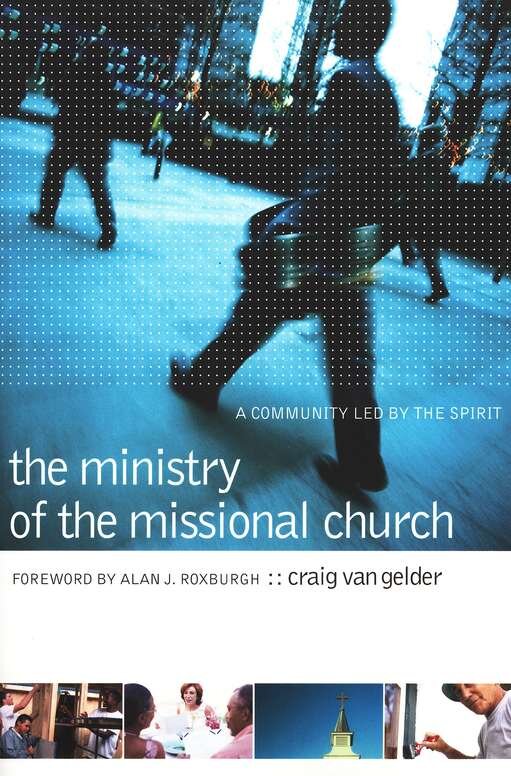Craig Van Gelder,— The Ministry of the Missional Church: A Community Led by the Spirit. Baker Books, 2007.
Prequel: Van Gelder, The Essence of the Church
Sequel: Rouse and Van Gelder, A Field Guide for the Missional Conversation
Referenced in: Missional Strategies by Craig Van Gelder
LifeandLeadership.com Introduction Summary
A Field Guide for the Missional Congregation.
Other works by Van Gelder such as The Missional Church in Context (2007), The Missional Church and Denominations (2008), The Missional Church and Leadership Formation (2009), while entitled in a way that may attract the interest of congregational leaders, are designed primarily for those who train church leaders on a college/seminary level.
Although not all of Van Gelder’s works are officially part of the Gospel and Our Culture Series, each is certainly of that ilk. Van Gelder is recognized as one of the most outstanding strategists in the missional conversation.
Summary: The Ministry of the Missional Church showcases Van Gelder’s rich background in a multiplicity of disciplines. He draws from theology, organizational systems, and change theory. Alan Roxburgh says of him, “I know of no other individual in the church world who understands organizational theory and organizational change as does Craig.” (13)
Chapters 1 and 2, Spirit-Led Ministry and Spirit-Led Ministry in the Bible, provide the biblical /theological framework:
“The ministry of the church in light of the ministry of the Spirit who leads the development of God’s mission and the deployment of God’s people. This is developed thoroughly from a misional/missio Dei perspective. God is a creating God who creates the church through the Spirit, who calls, gathers, and sends the church into the world to participate in God’s mission.” (18)
Instead of focusing on the purpose of the church as carrying out activities in the world on behalf of God, the church is seen as a participant in God’s mission in the world. The church becomes a sign that God’s redemption is now present in the world, a foretaste of what that redemption is like, and an instrument to carry that message into every local context and to the ends of the earth. (19)
Chapter 3, Spirit-Led Ministry in Context, considers the specific congregational contexts in which the Spirit’s leading is experienced, offering guidance to avoid becoming either undercontextualized or overcontextualized. The key again is to understand how the leading of the Spirit is shaping a congregation’s ministry. Van Gelder identifies seven inherent aptitudes that a Spirit-led, missional church need to cultivate in order to minister effectively within its context.
Chapter 4, Spirit-Led Ministry in the U.S. Context and in the Missional Church, gives special attention to how the church has been contexualized in the U.S.
Chapter 5, Spirit-Led Discernment and Decision Making, discusses how congregational leaders function to discern the leading of the Spirit in order to make decisions for the developing the church’s ministry. Here one finds evidence of Van Gelder’s rich integration of organizational theory. His models, “A Theological Theory of Action” and “Five Phases of the Discernment Process” are excellent.
Chapter 6, Spirit-Led Leadership and Organization, examines how Spirit-led leaders develop organization to support the ministry that results from the Spirit’s leading. Van Gelder offers an organization model, “A Congregation from an Open System Perspective” that encompasses community/environment; congregation/boundaries; feedback and results; purpose (mission), core missional practices, and vision; leadership and infrastructure; and the Holy Spirit guiding the transformation.
Chapter 7, Spirit-Led Growth and Development, explains how the ministry of the Spirit leads to growth and development of a congregation, integrating insights from the Spirit’s ministry in the book of Acts and theories of planned organizational change. Here Van Gelder evaluates missional-friendly types of decision-making and change strategies, and discusses how people in congregations respond to change.
From the Publisher
In a time when churches are focusing on finding strategies and techniques to guarantee success, a movement toward the missional church is emerging. Missional churches are communities created by the Spirit with a unique nature and identity. Purpose and strategies of the church are derivative dimensions, the activities that flow naturally from the church that is focused on Spirit-led ministry. The Ministry of the Missional Church leads pastors, ministry leaders, and laypersons through three simple arguments—the church is; the church does what it is; the church organizes what it does—in order to make sense of how missional churches work. And by focusing the work of the church as the work of the Triune God, this unique book will change the way readers think about the church and the world.
Join the missional church conversation. There’s a different kind of church conversation going on these days—one that moves beyond just focusing on purpose, strategies, or recovering early church practices. Craig Van Gelder argues that understanding the nature of the church is foundational for clarifying the purpose of the church and for developing and organizing its ministry. Moving beyond methods and techniques to create or sustain church growth, Van Gelder shows that when a church is focused on Spirit-led ministry, growth and development are the natural outcome. The Ministry of the Missional Church brings together theology and organizational theory in a way that inspires biblical and theological imagination about how to let the church be the church—a Spirit-led, missional community that seeks to participate fully in God’s mission in its particular place in the world.
About the Author
Craig Van Gelder serves as professor of congregational mission at Luther Seminary in St. Paul, Minnesota. He is the author of The Essence of the Church and the editor of Confident Witness—Changing World. He lives in St. Paul, Minnesota.
***For additional information on this resource, including reviews, click the bookstore links. Check the reference at page top or the links below for resource guides on related topics.***
See Resource Guides on Related Areas:
- Missional Perspectives, Introduction
- Missional Church Resources, Introduction and Index
- Church Leadership and Renewal, Index to Resources
See Resources on Over 100 Areas of Ministry Leadership:


